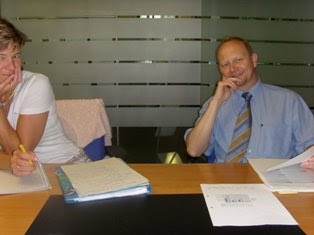The art of teaching conversation, part 3
Talking with your students is great fun, isn't it - especially when it's spontaneous and authentic, made up of real discussions regarding current issues.
As much as possible, as an EFL language teacher, you really want to steer your students away from the tired textbooks and encourage natural and fluent communication.
So why is this post called controlling the conversation?
All too frequently, students in wonderfully exciting dogme classes or Just Talking groups end up with the ability to converse comfortably - however after a while some cracks begin to show up.
 While breaking out of the book is important and teaching speaking is absolutely, in my mind and my students', the most important reason you're there with them physically, rather than handing over self-study books - the grammar and vocabulary which you can extract from the course books are the essential foundations of the house you're building, so mustn't be ignored.
While breaking out of the book is important and teaching speaking is absolutely, in my mind and my students', the most important reason you're there with them physically, rather than handing over self-study books - the grammar and vocabulary which you can extract from the course books are the essential foundations of the house you're building, so mustn't be ignored.
A while back, I created a set of Conversation Control sheets (named by my students -control as in Quality Control) one for me and one for each student, prompting them to selectively record their own areas of weakness, concentrate on the vocabulary they want to retain and generally become more aware of their language development.
 As you already know, it's a good idea to keep records, to have a tangible document which everyone can refer back to frequently over time, especially if you have to provide HR or your institute bosses with measurable data and want to acknowledge progress.
As you already know, it's a good idea to keep records, to have a tangible document which everyone can refer back to frequently over time, especially if you have to provide HR or your institute bosses with measurable data and want to acknowledge progress.
You can download them for free from this page:
Here's a video I made explaining how to use these:
Tip: Binding up a stack of these easily turns them into a language journal.
Enjoy!
Useful links related to this posting:
My website and those of my brilliant competitors, Jason West and Eric Roth:
Languages Out There and Compelling Conversations.
Best,
Karenne

Talking with your students is great fun, isn't it - especially when it's spontaneous and authentic, made up of real discussions regarding current issues.
As much as possible, as an EFL language teacher, you really want to steer your students away from the tired textbooks and encourage natural and fluent communication.
So why is this post called controlling the conversation?
All too frequently, students in wonderfully exciting dogme classes or Just Talking groups end up with the ability to converse comfortably - however after a while some cracks begin to show up.
- The students are fluent but their actual vocabulary/ grammar range is limited
- The students don't seem to be retaining the new vocabulary
- The students have become fluent but still make numerous mistakes and errors in accuracy
 While breaking out of the book is important and teaching speaking is absolutely, in my mind and my students', the most important reason you're there with them physically, rather than handing over self-study books - the grammar and vocabulary which you can extract from the course books are the essential foundations of the house you're building, so mustn't be ignored.
While breaking out of the book is important and teaching speaking is absolutely, in my mind and my students', the most important reason you're there with them physically, rather than handing over self-study books - the grammar and vocabulary which you can extract from the course books are the essential foundations of the house you're building, so mustn't be ignored.A while back, I created a set of Conversation Control sheets (named by my students -control as in Quality Control) one for me and one for each student, prompting them to selectively record their own areas of weakness, concentrate on the vocabulary they want to retain and generally become more aware of their language development.
 As you already know, it's a good idea to keep records, to have a tangible document which everyone can refer back to frequently over time, especially if you have to provide HR or your institute bosses with measurable data and want to acknowledge progress.
As you already know, it's a good idea to keep records, to have a tangible document which everyone can refer back to frequently over time, especially if you have to provide HR or your institute bosses with measurable data and want to acknowledge progress.You can download them for free from this page:
Here's a video I made explaining how to use these:
Tip: Binding up a stack of these easily turns them into a language journal.
Enjoy!
Useful links related to this posting:
- The role of pride in the language classroom
- Dealing with fossilized errors
- The role of anger in the language classroom
- Brainstorming topics for conversation classes
My website and those of my brilliant competitors, Jason West and Eric Roth:
Languages Out There and Compelling Conversations.
Best,
Karenne


























